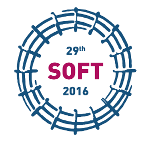Speaker
Sergey Ananyev
(Complex physical and chemical technologies)
Description
The basis of a thermonuclear fusion reactor is neutron source (FNS) based on the tokamak [1]. FNS should provide steady flow of fusion neutrons with a capacity of 10-50 MW, which reached close to the pulse values of existing installations JET and JT-60U. Fuel cycle technologies (FC) is one of the key elements for the FNS. FC systems should provide treatment and storage of deuterium and tritium, as well as the processing of the fuel mix in all systems of a thermonuclear reactor. These technologies have to be developed significantly, because the technical solutions chosen ITER project can be used in FNS is only partially due to steady state operation of the plant, the higher neutron fluxes and fluxes of tritium fuel cycle elements.
To assess the distribution of tritium in fusion reactor systems and components "tritium plant" is necessary to carry out a dynamic simulation of all system elements allowing for the operation of the tokamak. Such calculations are now performed using the code «FC-FNS» [2]. The code allows the calculation of tritium flows and stocks in tokamak fusion systems. To close the FC processes of tritium in the hybrid blanket was considered.
The report is a conceptual diagram of a stationary fuel cycle FNS with 3-50 MW of fusion power, given current estimates of the distribution of tritium in fusion reactor systems and components "tritium plant." Calculations of tritium flows and accumulation have been carried out for two different cases of the fuel mixture for neutral beam injection (NBI) system.
[1]. B.V. Kuteev, at al. // Published 26 June 2015 © 2015 IAEA, Vienna Nuclear Fusion, Volume 55, Number 7.
[2]. Anan’ev S.S. et al. Concept of DT fuel cycle for a fusion neutron source // Fusion science and technology vol. 67 mar. 2015
Co-authors
Alexander Spitsyn
(Complex physical and chemical technologies, National Research Center "Kurchatov Institute", Moscow, Russian Federation)
Boris Kuteev
(Complex physical and chemical technologies, National Research Center "Kurchatov Institute", Moscow, Russian Federation)
Sergey Ananyev
(Complex physical and chemical technologies, National Research Center "Kurchatov Institute", Moscow, Russian Federation)

